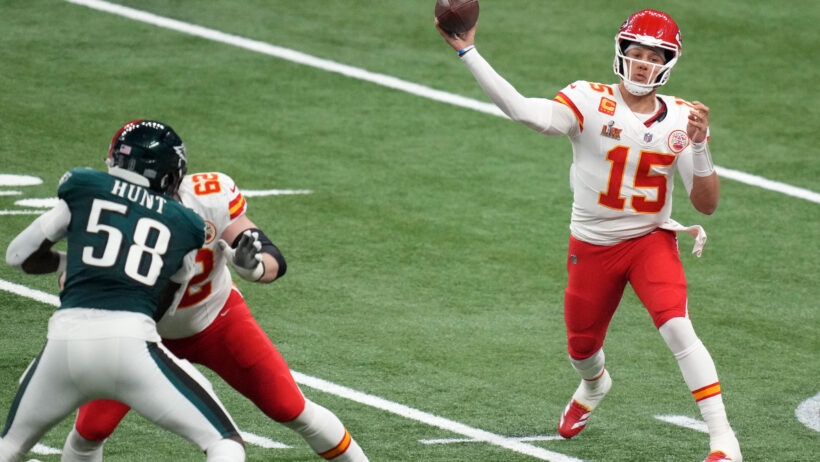Everything You’ve Ever Wanted to Know About Sports Betting Algorithms

- Sports betting algorithms are in their early stages, but they’ve already changed the way people bet
- Algorithms have been highly effective predicting outcomes in the world of finance
- Learn the pros and cons of relying on algorithms when evaluating sports bets
Turn on the news, and you’ll be bombarded with messages cautioning about the threats of automation and artificial intelligence (AI): dangerous self-driving cars, robots that will take all of our jobs, and artificial intelligence that will soon outsmart and turn against humanity. It’s easy to get caught up in the fear-mongering, but there are two sides to every story.
Sports betting algorithms and AI are in their early stages, but “sharps” are already using computer systems to bet on sports with astounding accuracy. Human analysis remains just as crucial, but there’s no denying that AI and complicated algorithms are hugely valuable tools for bettors who know how to use them.
Keep reading to find out how sports betting algorithms work – and how they’re sure to affect your future sports betting career.
How Do Sports Betting Algorithms Work?
Algorithms are mathematical formulas that organize and evaluate data to solve complex problems or answer complicated questions. Algorithms can be designed to “solve” the outcomes of sporting events based on relevant data like player/team statistics.
Sports betting algorithms and AI are in their early stages, but “sharps” are already using computer systems to bet on sports with astounding accuracy.
What Kind of Data Do Algorithms Need?
Sports betting algorithms tend to deal with relatively straightforward data. For example, if someone was writing an algorithm with the express purpose of predicting an NFL game, the algorithm might rely on data like a teams’ home winning percentage, rushing yards, and successful reception percentage.
There is a vast amount of sports data available to the public. Of course, there’s a wealth of basic sports information on teams and players available online, but you may be surprised to hear that many of advanced analytic tools (like Corsi, Fenwick, etc.) are also just a few clicks away. The availability and accessibility of information on the web dramatically increases what sports betting AI and algorithms are able to accomplish.
Algorithms are much more accurate when they have many different points to analyze. As such, a successful sports betting algorithm combines technology and publicly-available information.
Machine Learning and Neural Networks
Machine learning takes things a step further, applying artificial intelligence to algorithms. The application of machine learning produces a system with the ability to learn from experience and improve over time. A machine learning algorithm can both access and process the data it needs to make decisions, predict outcomes, and operate successfully without constant tweaks and manual input.
A machine learning algorithm is technically artificial intelligence. Not only can it make independent decisions and predictions without any direct human involvement, but it’s also based upon something called “neural networks.”
What Is a Neural Network?
We’d need several pages to explain exactly what neural networks are, but in short, they are programs built to mimic the operation of neural networks inside the human brain. Studies have shown that building neural networks into machine learning algorithms is a highly effective way to improve their ability to solve complex problems, quickly.
Machine learning algorithms are growing in capability and availability every year, and they are doubtless the hottest and most promising tool related to both classification and prediction.
There are billions and billions of dollars wagered every year in the global sports betting market. As such, a machine learning algorithm that can predict the outcome of sporting events is massively profitable to anyone with the skillset to create one.
Of course, there are lots of intrepid entrepreneurs out there doing exactly that.
Who Makes Sports Betting Algorithms?
The rise of sports betting algorithms has a lot of crossover with the brightest minds from the stock market. Sports betting algorithms are yet another tool that “sharps” have lifted from the increasingly interlinked fields of sports betting and finance.
Since the turn of the 21st century, an expanding number of super successful money managers use algorithms to process data faster and more accurately. They remove human error, as well as human bias (emotional investments).
Machine learning algorithms have been wildly successful in finance. The best and the brightest in the finance world are now applying these same advantages to yet another profitable enterprise: sports betting.
The Real Life Application to Sports Betting
Let’s take a look at one firm that’s using AI to make accurate predictions and bridge the gap between investing and gambling.
Strategem designs their sports betting algorithms to predict European football games. They believe that soccer games are among the most predictable events in the entire world. In their words: “They’re short duration, repeatable, with fixed rules. So if you observe 100,000 games, there are patterns you can take out.”
The idea at Strategem is relatively straightforward: Discern patterns, absorb them, and gain an edge over bookmakers. Finding patterns (and factoring them into your bets) can equals a ton of cash in sports betting!
Using machine learning, Strategem has developed proprietary algorithms that are exceptionally well-suited to processing and analyzing a tremendous amount of data. Their goal is to create a sports betting algorithm that can provide real-time insight into live matches. From there, they hope to apply the algorithm to live-betting at different sportsbooks.
It’s undeniable that these algorithms are improving rapidly, and they’re only going to get better with time. As they become more precise and accurately-engineered, more people will start relying on them.
Stratagem is still relatively far from creating an algorithm that can watch live events and offer cutting-edge insight (for example, they haven’t figured out the algorithm to avoid factoring in replays). However, machine learning is still helping the company gain an edge in its sports bets. For example, Stratagem is employing machine learning to find the most attractive lines across sportsbooks.
It’s undeniable that these algorithms are improving rapidly, and they’re only going to get better with time. As they become more precise and accurately-engineered, more people will start relying on them.
Not convinced? Look at the financial world, where machine learning and algorithms started out as a niche specialty during the 1980s. Now, every financial institution and fund worth its salt employs algorithms to process information and solve problems. The future is here for sports betting, though it may be unevenly distributed at the moment.
What Are the Flaws with Sports Betting Algorithms?
As helpful and intelligent as these algorithms and machine learning are, they aren’t much use unless they’re supplemented with real human analysis.
Artificial intelligence can create maps (or partial representations) of sporting events, but they can’t fully represent the “territory,” which refers to the entirety of the sporting event.
Say that a star NHL player stays on the ice, despite suffering a horrific injury. At least for now, AI cannot understand or process this type of information, because its impact is difficult to quantify. A sports betting algorithm can’t pick up on the player grimacing or playing with dramatically-reduced effectiveness.
Additionally, a sports betting algorithm can’t pick up on shifts in momentum, or its effect on the emotions and psychology of players.
Each team’s starting lineup is most significant predictive factor in any sporting event, and acquiring this information before it’s formally released to the public can prove to be immensely profitable.
Naturally, AI and sports betting algorithms don’t acquire this information on starting lineups before the bookies do. To get these inside scoops, you need sources and the ability to build mutually-beneficial relationships with other people. This is still the realm of humans: chatbots aren’t in on all of the secrets quite yet.
You Can Use Algorithms to Boost Your Winnings
AI, algorithms, and machine learning are particularly enticing tools because even small gains in their capabilities can end up being immensely profitable. Computers aren’t going to supplant true “sharps” anytime soon, but it can’t hurt to start thinking about using them now. Sharp money is a visible feature on this NFL betting odds page, that’s a percentage difference between bet % and money %, which can give bettors the edge.
Of course, even the best tools rely on a capable user. Check out our comprehensive guide to sports betting strategy to sharpen your own skills before throwing a computer into the mix.

Evergreen Manager; Sportsbook Expert
Following a sports journalism career with his work appearing in outlets like theScore, The Province, and VICE Sports, Patrick moved into the world of content marketing to bridge the gap between great writing and SEO success. He’s brought that same mindset to lead evergreen content efforts at SBD.



